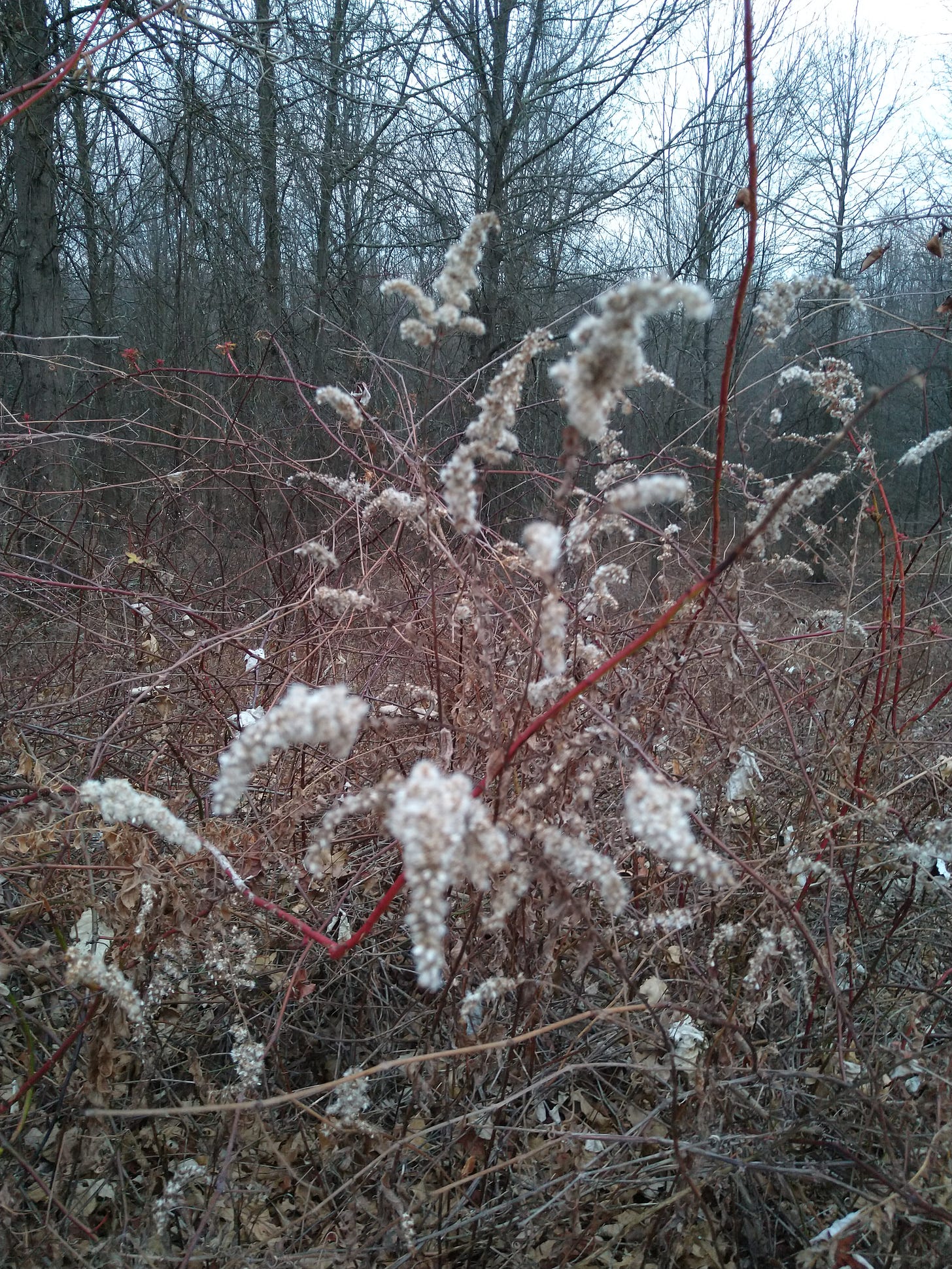I had a baby less than a month ago, so my New Year's resolutions are a little gentler this year.
Resolving to run a mile three times a week is currently medically inadvisable, if not impossible. Instead, I resolved to take a twenty- to thirty-minute walk every day before dinner. I walk the field near my house, sometimes solo, sometimes with one of my kids with me. I can invite one person into a companionable solitude where we talk or keep silent, and it’s a good way to spend one-on-one time with my older kids—something I could never do on my runs, even if they were objectively more impressive and better for my long-term health.
Similarly, I have enough writing ideas to set a goal of one article a week, but I only have free hands, a clear table, and the necessary mental powers for about five minutes an evening. Instead, I journal a few lines in my Sacred Ordinary Days planner and let the rest of my ideas sift around during my evening walks and midnight feeds, not worrying about when or whether I’ll write them down. The ideas will keep flowing, and I’ll capture the ones that matter.
One might expect me to approach my reading goals with this same humility and reasonableness, but that is not so.
If my reading goals last year taught me anything, it was that having a strong list of titles actually relieved bookish overwhelm instead of adding to it.
I much prefer having books lined up on my to-be-read list, rather than hunting last-minute through my bookcases or Libby or Hoopla for something I’m in the mood for. I can still choose book that are not on the list, as I did a lot last year, but I save time and trouble by having my big reads follow a theme.
Filling in the Gaps
This year’s theme is “filling in the gaps” in my repertoire of famous playwrights.
The Complete Works of Shakespeare
The Complete Plays of Chekhov
The Skin of Our Teeth by Thornton Wilder
Cat on a Hot Tin Roof by Tennessee Williams
A Man for All Seasons by Robert Bolt
Becket by Jean Anouilh
Oedipus Cycle by Sophocles
Medea by Euripides
My list is somewhat arbitrary. I wanted to read the complete works of Shakespeare and Chekhov because I love their plays that I’ve already read.
I wanted to expand on the little I’ve read of Thornton Wilder, whom I enjoyed, and Tennessee Williams, whose work I’ve deplored, by choosing something of theirs with which I’m not yet familiar.
I’ve enjoyed the famous 1960s film versions of A Man for All Seasons and Becket, so I wanted to read the original plays.
Finally, I give a nod to the ancient Greek playwrights whose works are still read and performed two thousand years later.
First Steps
I still have to finish Pascal’s Pensees from last year, and I will continue to read Catherine and Madeleine des Roches’s poetry and essays.
I’m starting my Shakespeare list with the historical play King John. (Note: in the audio for this essay, I said I'd start with Henry IV, Part 1.)
Other Things I’m Reading
Crosswicks: A Circle of Quiet by Madeleine L’Engle
I have her to thank for my evening walks and journals. Reading her short vignettes about writing, family life, and ontology or isness helped clarify the things that would help me remember my own ontology.
War and Peace by Leo Tolstoy
Funny story, depending on your sense of humor. My lovely husband read about a dozen chapters to me while I was in labor with our new baby, basically keeping me going until contractions were coming too quickly to fit in a paragraph. However, as we were reading about Prince Andrei Bolkonsky depositing his very pregnant wife with his family, I suddenly recalled what happens to his very pregnant wife. Nate did not, but he promised to skim each chapter before reading it to make sure we did not read something ill-suited to the moment. Thankfully, Tolstoy takes a hundred-page detour into the Napoleonic Wars, so we could just read about soldiers killing each other.
The Dean’s Watch by Elizabeth Goudge
A story about a watchmaker, some orphanage, and the dean of a cathedral in an unnamed 19th-century British city. I’ve shared my love of Goudge’s writing before, and this book possesses the same qualities I loved in The Scent of Water, even though the plot, setting, and characters are very different.
A Favorite Quote
“The concentration of a small child at play is analogous to the concentration of the artist of any discipline. In real play, which is real concentration, the child is not only outside time, he is outside himself. He has thrown himself completely into whatever it is that he is doing. A child playing a game, building a sand castle, painting a picture, is completely in what he is doing. His self-consciousness is gone; his consciousness is wholly focused outside himself.”
Madeleine L’Engle, A Circle of Quiet
A Journal Excerpt
Tuesday, January 2
I walked with Eleanor before dinner. It was quite dark, and she walks slowly in her snow-pants, so we only walked halfway across the field and back, holding hands all the while. We didn’t talk much, but we were just happy to be together in companionable silence. We talked about the stars and the bright planet Jupiter shining through the branches above our house. We kicked up dry sycamore leaves at the edge of the pond and stomped on tire tracks frozen in the mud.





